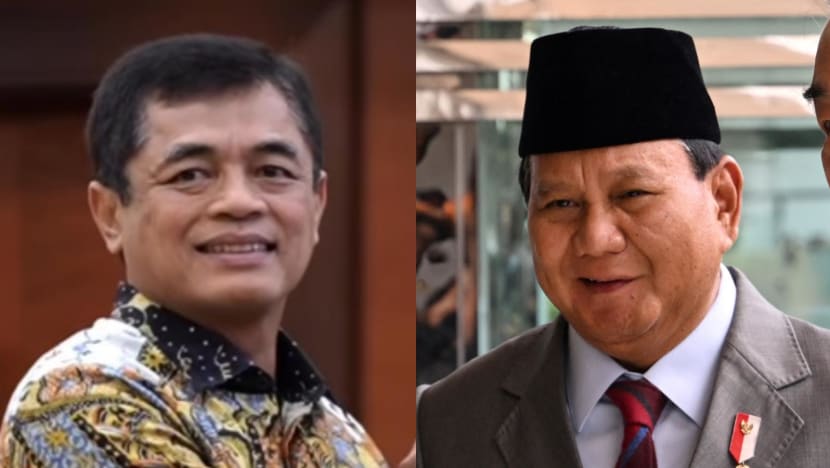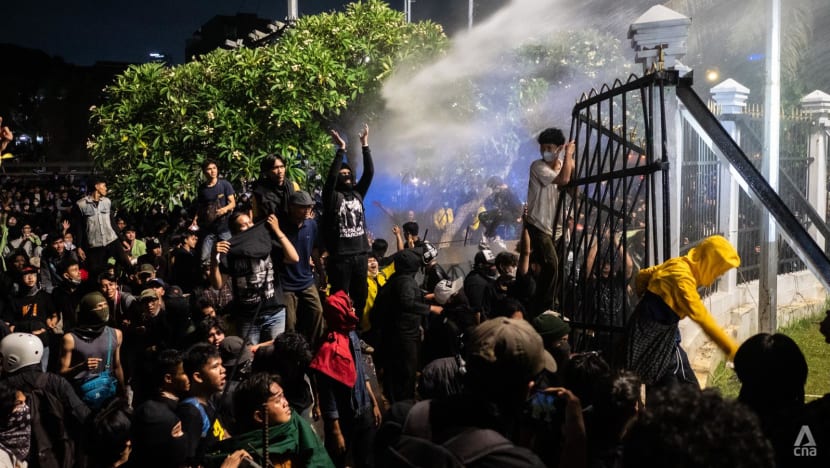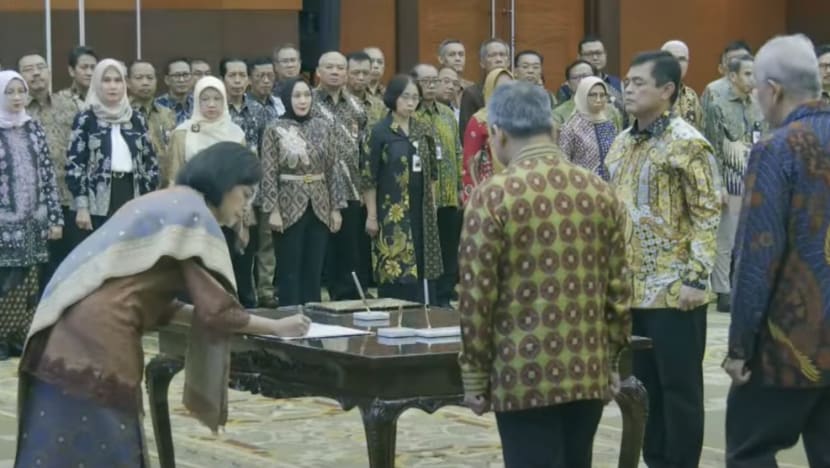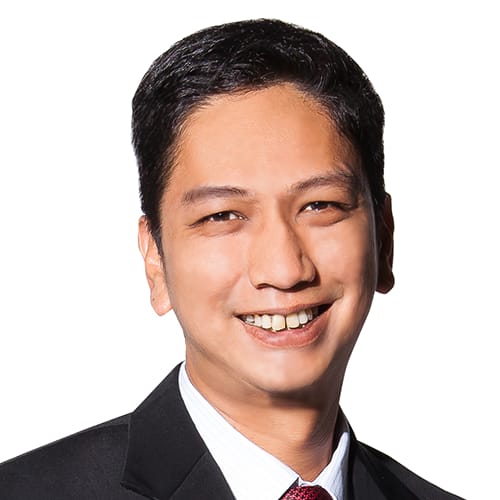Fiercest outcry yet of Prabowo placing uniformed men in civilian posts, as convicted army general becomes customs chief
Lieutenant General Djaka Budhi Utama was sworn in as director-general of Indonesia’s customs and excise office on Friday (May 23). This marks one of the most senior roles handed to an active military officer under President Prabowo Subianto’s watch.

Lieutenant General Djaka Budhi Utama (left) was appointed Indonesia’s customs chief by President Prabowo Subianto (right). (Photos: Facebook/Sri Mulyani Indrawati, AFP)

This audio is generated by an AI tool.
JAKARTA: An active military general previously convicted of kidnapping pro-democracy activists was appointed on Friday (May 23) to a key role in Indonesia’s Finance Ministry, sparking what observers say is the fiercest criticism yet of President Prabowo Subianto's moves to place senior uniformed personnel in top civilian roles.
The swearing-in of Lieutenant General Djaka Budhi Utama as director-general of Indonesia’s customs and excise office also heightens fears of a return to the days of Suharto’s rule, when the military had far-reaching control over civilian life, the experts also say.
Previously a senior official at the State Intelligence Agency, the 57-year-old Djaka joins a growing list of active military or police officers given strategic government roles since Prabowo – himself a retired general – took office last October.
That same month, the president appointed Lieutenant Colonel Teddy Indra Wijaya as cabinet secretary, a minister-level position. Teddy was Prabowo’s aide during his time as defence minister from 2019 to 2024.
At least six active military officials have since been appointed to various roles in ministries, agencies and state-owned enterprises.
On Monday, an active police officer, Inspector General Mohammad Iqbal, was appointed secretary-general of the Regional Representatives Council (DPD), one of two parliamentary chambers of Indonesia.
Their appointments have incited worry that Indonesia is returning to the days of the authoritarian rule of Suharto, who governed from 1968 until 1998. The Suharto era saw the military in control of nearly every aspect of civilian life until a student movement forced him to resign on May 21, 1998. Suharto was also Prabowo’s father-in-law.
Djaka’s appointment, however, has sparked greater concern among activists and experts because of his previous conviction and the technical role he has been given.
His is also one of the most senior roles handed to an active military officer under Prabowo’s watch.
DJAKA HAS RESIGNED FROM MILITARY, SAYS MINISTER
In 1999, Djaka and 10 other members of the special forces’ “Rose Team” were found guilty by a military tribunal for the 1997-1998 kidnapping of 22 pro-democracy activists who were critical of then-president Suharto. To this day, 13 of these activists are still missing.
Djaka, then an infantry captain, was sentenced to 16 months in prison for his role in the kidnappings. Despite this, he got to keep his job in the military. The other defendants were sentenced to 16 to 22 months in prison.
“Victims and their families have been fighting for justice for decades. How can victims get the justice they deserve when perpetrators are given strategic government positions?” Ardi Manto Adiputra, director of human rights advocacy group Imparsial, told CNA.
Prabowo, too, is accused of being involved in a number of human rights abuse cases, including the kidnappings. Although he never faced any charges, Prabowo was discharged from the military shortly after Suharto fell from power in 1998.
Djaka was Prabowo’s subordinate when the latter led the Army’s special forces command in the 1990s, which also sparked concerns among experts that the president is less interested in installing the best man for the job and more about rewarding loyalists with strategic posts.
To be sure, Prabowo’s predecessors have also allowed active soldiers to take up civilian posts. But they have usually been limited to roles involving security, law enforcement, intelligence and disaster mitigation.
Since its founding in 1972, chiefs of the National Search and Rescue Agency (Basarnas) have been active generals. Meanwhile the National Disaster Mitigation Agency (BNPB), which was founded in 2008, has been helmed by active generals since 2019.
In March, Indonesia’s parliament, which is controlled by Prabowo’s coalition of parties, passed a revision to the law on the military, formally allowing active military officers to assume roles in 14 government ministries and agencies without first resigning.
The revision sparked widespread demonstrations across Indonesia, some of which ended in violent standoffs between protesters and security officials.

But the finance ministry is not among the 14 public offices allowed under the new law, and experts said Djaka must resign from active duty in the military.
According to Coordinating Minister for Economic Affairs Airlangga Hartarto, who was quoted by Antara news agency on Friday, Djaka submitted his resignation before he was sworn in.
The Indonesian armed forces have not responded to CNA’s request for confirmation regarding Djaka’s status in the military.
“ARE THERE NO CIVILIANS MORE QUALIFIED?”
The other area of controversy is the opaqueness of Djaka’s appointment and whether there was no technocrat better suited for the role.
“Why (Djaka)? Why appoint a general? Are there no civilians who are more qualified? Was Djaka appointed simply because of his closeness to Prabowo?” questioned Al Araf, chairman of security and human rights research group Centra Initiative.
News that Djaka was set to be the new customs director came on Tuesday when he was summoned to meet Prabowo at the State Palace in Jakarta. Also summoned was Bimo Wijayanto, a civilian bureaucrat who was also sworn in on Friday as the new director-general of the finance ministry’s taxation office.
According to Detik news portal, Bimo later told reporters that he and Djaka met the president as they were to assume “new roles at the finance ministry”. Djaka declined to speak to the media.
Finance Minister Sri Mulyani Indrawati said on Friday that Prabowo wanted to see the pair because their roles are vital to bringing in state revenue.
“Djaka’s presence provides an added value which we hope can support and enhance the Finance Ministry’s ability to coordinate with law enforcers and other institutions better and more effectively,” Sri Mulyani said of the three-star general’s military background.

But questions persist over whether he is qualified for the role.
“It is true that there are problems like corruption and the smuggling of illegal goods which requires someone with an iron fist,” said Bhima Yudhistira, executive director of the think-tank Center of Economic and Law Studies (Celios).
“But being a customs chief also requires sufficient knowledge of the economy so they can formulate the right policy and strategy to increase state revenue without burdening businesses and consumers too much,” Bhima told CNA.
“The appointment of a military man with little economic experience sends the wrong message to businesses and investors. They need competent people to helm strategic economic roles so they know that Indonesia’s economy is in the right hands.”
In recent months, Prabowo’s policies, such as backtracking on a planned value-added tax hike that would have boosted government revenue, have rattled investors.
Meanwhile, Djaka’s appointment suggests the Prabowo administration will not restrict the presence of military or police personnel to the 14 ministries and agencies allowed by law, analysts said.
“The Prabowo administration keeps on saying that it is not militarising the government, that the military will only have additional roles in 14 ministries and agencies,” Human Rights Watch’s Indonesian researcher Andreas Harsono said.
“It says a lot about not only the intention of President Prabowo to revive the Suharto period with many active military officers in civilian roles,” Andreas added.
“It also exposes cynicism that Prabowo could make someone with a checkered past like Djaka to head the customs office.”


















